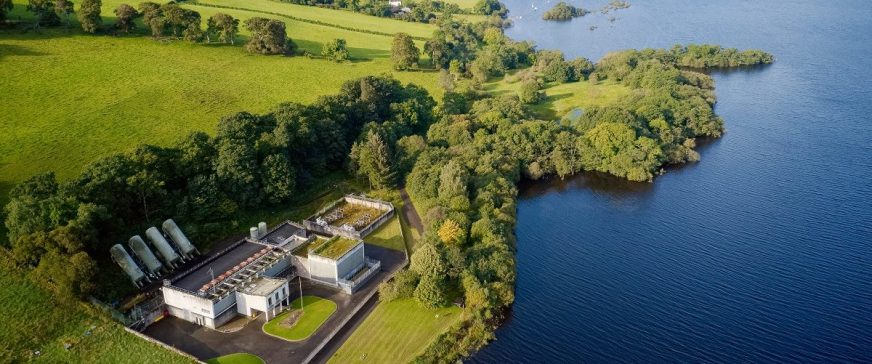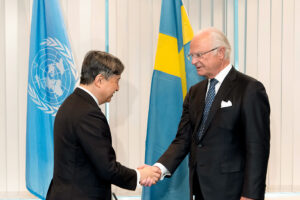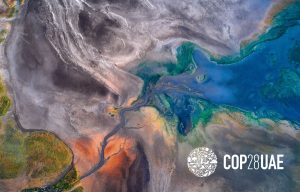- SIWI – Leading expert in water governance
- /
- Latest
- /
- Building back better, greener, and bluer through water
Building back better, greener, and bluer through water

The 2020 HLPF is especially significant in that, ten years out from the 2030 delivery deadline, this session will launch accelerated global efforts for the next decade and focus on ways to operationalize the decade of action through concrete approaches and policies that can accelerate progress towards the SDGs.
The 2020 HLPF theme is aptly titled “Accelerated action and transformative pathways: realizing the decade of action and delivery for sustainable development”. The agenda is guided by the landmark Global Sustainable Development Report (GSDR), “The Future is Now: Science for Achieving Sustainable Development” which not only identified key entry points and transformative levers for realizing the 2030 Agenda.
It also confirmed the need for a systemic and holistic approach based on the interlinkages between all 17 SDGs. It is also guided by the Political Declaration adopted at the September 2019 SDG Summit, which identified ten cross-cutting areas for advancing the SDG and renewed commitments to, among others, universal access to safe drinking water and sanitation and the conservation and sustainable use of our planet’s marine and terrestrial resources.
We at SIWI were encouraged to see elevated our call for integrated and transformative action across the 2030 Agenda by governments, scientists, and civil society alike and emphasized in our open letter, “Water as a Catalyst for Collective Action in the Next Decisive Decade” that wise and resilient water management can yield positive synergies and co-benefits across all the sustainable development goals.
Covid-19 also forms an important, inescapable backdrop to this year’s HLPF. Government representatives and civil society participants will discuss the impact of the Covid-19 pandemic on SDGs progress and reflect on how the international community can respond to the pandemic while accelerating action on the SDGs. During the opening statement on 7 July, H.E. Ms. Mona Juul, President of Economic and Social Council will address the importance of international solidarity and a multilateral response to the pandemic and promote the SDGs as guideposts for building back better while leaving no one behind.
SIWI, together with the governments of Tajikistan, Norway, and South Africa, and Women for Water Partnership, is pleased to contribute to the HLPF’s vision of building back better while leaving no one behind by organizing an official side event on the HLPF opening day, 7 July, called “Water as the Economic Driver: a transformative pathway towards jobs, decent work, and an inclusive economy.”
An estimated three out of four jobs that make up the global workforce are either heavily or moderately dependent on water. Decent jobs today and in the future are directly linked to water management, in areas such as providing water supply, infrastructure and waste management; and water-dependent sectors, such as agriculture, fishing, energy, industry and health. Although water will mainly be discussed under the official HLPF thematic session on Protecting and advancing human wellbeing and ending poverty alongside SDG 1 (No poverty), SDG 3 (Good health and wellbeing), SDG 4 (Quality education), SDG 16 (Peace, justice, and strong institutions), and SDG17 (Partnerships for the Goals), our side event aims to shed additional light on the synergies between SDG 6 on Water and SDG 5 (Gender equality), SDG 8 (Decent work and economic growth), and SDG 13 (Climate action).
In fact, because water can make a transformative contribution across all of the 17 SDGs as detailed in our UN HLPF ECOSOC input and in our written submission to the General Debate, we hope that all six thematic sessions will comprehensively include discussions on water. In particularly, we believe that water plays a central role in Ending hunger and achieving food security, Responding to the economic shock, relaunching growth, sharing economic benefits and addressing developing countries’ financing challenges, and Protecting the planet and building resilience.
Finally, we encourage governments, as they discuss and adopt the draft Ministerial Declaration, to translate into action their commitment to an integrated approach to realizing the 2030 Agenda indeed by urgently addressing emerging water crises, ensuring equitable and universal access to safe drinking water and adequate sanitation, and conserving and sustainably using natural resources including freshwater resources.
With less than ten years on the clock, we must bounce back collectively from a global pandemic, respond to yet-to-come natural and man-made disasters, and at the same time, reach the Sustainable Development Goals finish line. We can get there when we value our resources, especially our water. By placing water at the foundation of our policy priorities, actions and solutions, we can more quickly and more efficiently set new pathways to arrive at a more sustainable and resilient future, capable of responding to risks and shocks, and even thriving as we learn to adapt and transform when needed. By recognizing the value of water for people, the planet, and our prosperity, we can work more efficiently toward the achievement of the entire 2030 Agenda.
Most recent

Strengthening the Board of Stockholm Water Foundation (SWF)
- Stockholm Water Prize
- Stockholm Junior Water Prize
- Youth and water
- World Water Week

Water is our future – but Sweden still lacks a comprehensive strategy
- Water and the 2030 Agenda
- Groundwater
- Agriculture and water
- Cities
- Disaster risks and water

Sweden and Japan Join Forces on Water and Climate at High-Level Tokyo Seminar
- Swedish Water House
- Water and climate
- Water cooperation

The Road to Water Action in 2024 – Join us at World Water Week

The world can’t afford a water dry Summit of the Future



